|
Word Gems
exploring self-realization, sacred personhood, and full humanity
Editor's Essay
|
“Why the world doesn’t need Superman”
Pondering the question of God’s seeming unconcern and uninvolvement regarding the suffering and calamity on planet Earth.
|
return to "Suffering" main-page
Douglas Adams, The Restaurant at the End of the Universe: "In the beginning the Universe was created. This has made a lot of people very angry and been widely regarded as a bad move."
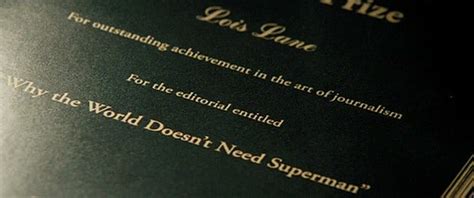
In “Superman Returns” (2006) we find an angry Lois Lane having written an editorial, “Why the World Doesn’t Need Superman.”
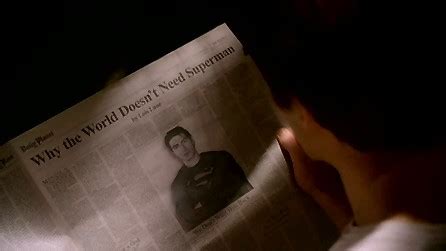
She’s miffed because the one she loves had left on a 5-year journey but had not even said good-bye before departing.

He consoles her with “I’m sorry I left you, Lois.” And then takes her high above the city.

He wants her to know, “You say the world doesn’t need Superman, but, everyday, I hear them calling to me.”
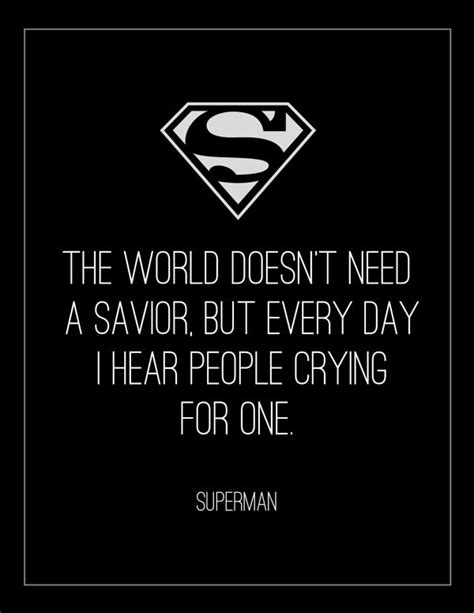
how this article came to be
Superman Returns is a favorite movie, and as I watched it again I thought about this issue of the world crying for a Superman, someone to swoop in to save us from our troubles.
It’s common for people to lament, “Why is there so much suffering in the world? If there’s a God, why does he allow all this evil? Why doesn't God just stop evil before it happens?”
This question, this accusation, has been with us for a very long time.
|
blaming 'the man upstairs'
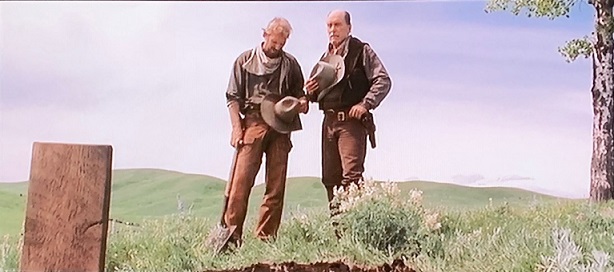
Open Range (2006), Kevin Costner, Robert Duvall
|
“Now if you wanna say a few words to the man upstairs, I’ll just stand here, hat in hand, and listen, but I ain’t talkin’ to that s.o.b. who let befall what happened to a sweet kid like Mose.”
|

Editor’s note: Yes, we understand, it can seem very unfair. However, when things go wrong it’s easy to blame God, but on days when the sun is shining and the stars align the ego tends to take full credit.
|
Lois’ editorial started me thinking about this, but it also came to mind as a result of my research for the “Quantum Mechanics” series.
It has to do with entangled particles.
Editor’s note: All analogies imperfectly describe a subject under review. However, I hope that the purported similarities derived from the following will not seem too unlikely.

If two particles are created together, they might undergo what is called “quantum entanglement.” This means that, even though the particles might be at opposite ends of the universe, they affect each other’s movement, and do so – instantaneously.
Einstein didn’t like this idea at all. If this proposition were true, it would mean that the particles could potentially communicate faster than the speed of light. But, according to Special Relativity, this is not possible in our universe.
Einstein called this instant messaging “spooky action at a distance.” He spent the last decades of his life attempting to overthrow this idea. He failed. Quantum entanglement has now been experimentally verified.
what does this have to do with 'the world doesn’t need Superman'
Not much – except for the structuring of the problem-solution, which is similar. Here’s what I mean.
it’s all just a big misunderstanding
Einstein said that it’s not possible for two separated particles to communicate faster than the speed of light - but here’s the deal. It’s all just a misunderstanding.
The particles aren’t far apart – they’re still connected; rather, they’re really a unitive whole.
And, they aren’t even particles yet – they’re just “probable particles.”

It’s more like this: the two “probable particles” are still part of a “wave of probability” that might stretch across the universe. They won’t become actual particles until a “measurement” is taken.
and it’s all just a big misunderstanding, too, blaming 'the man upstairs'
This question of “Why does God allow suffering,” of course, is a universal question and has been asked for thousands of years, and we cannot address every nuance of the query here. But what I hope to do is frame the issue in terms of broad existential parameter, and then leave it to you, and your own meditations, to fill in the gaps.
Editor’s note: You will be given this insight as part of the "arrabon of the purified consciousness" - if you allow it, if you don't block it; because, as we’ve seen, God teaches each of us on an individual basis, in a fair and just manner, with no "favorite kids"; and this essential orientation concerning the nature of God, and God’s mode of dealing with humankind is not a side issue but fundamental to our development, and so, assuredly, we will come to see how all this works, if we “open a channel,” quiet the ego, and allow ourselves to be taught.
It’s all just a big misunderstanding, because God:
has not gone away somewhere
is not aloof, uncaring, and detached
closely superintends our growth and development but with laissez-faire management
does not allow “evil” - because what we call “evil” does not exist, as such, but represents humankind's feckless, ego-centered quest for happiness, thereby becoming a vital part of the “classroom lesson plan,” lesson-plans we ourselves write, all of which is a primary reason why we came to this world
allows, and requires, us to experience the consequences of our own actions, for, suffering endured, with equanimous and undespairing mind, summons to itself an endowment of what will yet become, not only our sanctified wisdom but, an astonishing heightened capacity to experience joy, wonder and bliss
is preparing us, maturing us, psycholgically, spiritually, for what comes next; and it's not a small thing
|
rendered them more sensitive to never-ending happiness
The following was given by Margaret Fuller (Countess Ossoli), December 5, 1852, via the mediumship of Mrs. Elizabeth Sweet, reported in The Future Life.
Editor’s note: Margaret Fuller (1810-1850) died, with her husband and little boy, in a shipwreck. One of the Transcendentalist intellectuals of her day (with Emerson), she advocated human rights and enlightened feminism. The first American female war correspondent, Fuller wrote for Horace Greeley's New-York Tribune. Two years in Summerland, she offered this comment:

“The winds of adversity which passed over their souls while on earth, but purified and chastened them, and rendered them more sensitive to the enjoyment of never-ending happiness.”
Editor's note: see more of Margaret Fuller's testimony on the "Summerland: 1-Minute" page.
|
'the last freedom'
The great souls of the past teach us that, even in times of extremity and privation, when all seems lost, even a doubtful tomorrow, a human being retains one inalienable freedom, a claim to veritable godhood: the ability to choose, in the midst of crisis and chaos, one’s attitude toward suffering - "the last freedom," as Dr. Frankl called it. Fortitude as this invites a hidden and unexpected benefit, of eternal significance.
Volumes could be written here concerning the nature of suffering, but they’ve already been written – by many writers of history, and, for no extra charge, even by myself.
I must direct you to “the 500 tape-recorded messages from the other side” article. Therein, you’ll find lengthy discussion on “the meaning of helping someone.”
Editor's note: It's not so easy, and almost impossible, to "help" without harming creatures laden with "free will." So often, the "help" promotes a co-dependency and servileness, a victimhood and welfare-mentality, utterly counterproductive to the maturation-individuation process. Many times, the best we might offer is the encouragement, "you can do this," "I believe in you" - to rise above and work things out with one's own divine "made in the image" potential.

think of the butterfly escaping the cocoon,
it must do this alone, without "help"
- or it will be destroyed by the "help"
Counter-productive "help" is the central precept of the question before us.
If God, in fact, did “help” us by swooping in, like Superman, to save us from what we call evil or calamity, how would this affect our development as sentient, self-regulating, meant-to-be autonomous individuals?
Would we even like being supervised, nannied, every moment of our lives? - slapped on the fingers everytime we even thought about doing something less than perfect?
How would we overcome our systemic selfishness if we couldn't do anything on our own? What would become of free will, autonomy, and personal responsibility?
How would we learn of the nature of evil if its consequences were immediately removed?
What kind of shallow, spoiled-brat creatures would we turn into if the results of our own actions did not dissuade, and teach, us?
|
don’t worry about threats, they can only kill your body, and that’s not much
In the writing featuring Revelation’s metaphoric ‘Beast’ and ‘False Prophet’ – the Monster Mentality and the Lying Teacher -- we discussed that these dark symbols do not refer to any particular person, currently or in history, but depict the dark side of every human being, but coming to full-flower in some.
Look at any page of a history book, concerning any time period, and you will find a chronicle of wars, brutality, murder, oppression, deception, propaganda, treachery, fraudulence. This is the human condition in its unenlightened state. The world is run by Dear Leaders who control all aspects of society: military, corporate, religious, academic, political, small social groups, and, too often, families.
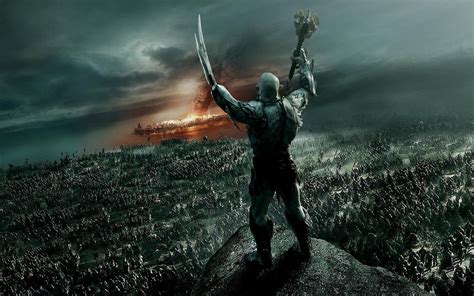
History, in a sense, runs in cycles, an ebb and flow of a certain quietude but then overwhelming with blatant, frothing, despotism and autocracy. There is no single “end time” but many “end times” in which the ambitions of the insane-for-power rise to frenzied levels. Today, right now, we are witnessing the final stages of one of these recurrent eruptions of naked totalitarian power-grab. All this is part of the collective lesson humankind is meant to learn before we move on to the next worlds.
The darkness is very thick today, like a black cloud from Mount St. Helens moving in. We have ones, right now, like William Wilberforce, who tirelessly worked to abolish slavery and instantiate human rights, who are constantly attacked by the vested interests who would lose much if reforms were instituted. And this is why we see the witch hunts, the non-stop character assassination, the false indictments, an overturning of the rule of law – anything, to stop the reformers.
The modern William Wilberforce loudly pledges to destroy the entrenched enemies of society. And this sends the dug-in prevaricators to desperate panic. What most people don’t realize is that, if the reformers, in fact, do gain legal right to assume office, the “hidden government” is not going to quietly lay down their arms and acquiesce to being destroyed. In their frothing “madness maddened” cravings for power, they would rather destroy the country and the world than to see their empire dismantled. And this means that we are headed for a conflagration that we’ve not seen before in this country. People are not prepared.
And in the midst of all this deep-rooted tyranny, we find Jesus saying – as he himself lived in a totalitarian society – that, yes, we might experience threats to our person when bad comes to worse. There’s a New Testament verse which illustrates, but, before reading it, consider what he did not say. He did not say,
“When the Dear Leaders enter a blood-in-the-water frenzy for all-out control, do not call all your friends to create a lobbying group to awaken a sleeping God; do not act as if you need to ‘inform the deity and then ask for a favor’; do not think that prayer is some sort of peddling technique to twist God’s arm to get what you think you want and need."
No, the condition of the world cannot be changed, not until, as the Gospel of Thomas instructs, each person discovers the light within. And so, there will be no Superman to swoop in to save us, that’s not why we came here, and some of us could be killed.
But the good news is that when they kill your body, that’s all they can do to you. And that’s not very much. Your future good life, held in trust for you, cannot be touched by the ‘Beast’ and ‘False Prophet’. What Jesus did say is this:
Do not be intimidated. Eventually everything is going to be out in the open, and everyone will know how things really are. So don’t hesitate to go public now. Don’t be bluffed into silence by the threats of bullies. [They can kill only your body, but there's] nothing they can do to your soul, your core being. Jesus of Nazareth, Matt. 10:27-28, The Message translation
|
the padded playpen
How would we shed our entrenched naiveté and childishness, our systemic foolishness, if God had us grow up in a “padded playpen” with no possibility of injury, loss, or misstep?

Without certain difficult experiences, how would we gain insight and understanding of the nature of things, of natural law and reality, of God’s mind?
And without this wisdom, and resultant maturity, if the dysfunctional ego ruined us this way with "me-sim," how would we “survive the terror of living forever”?
Editor’s note: We’re playing ‘for keeps’ here. Think of this: someday, when you’ve lived as an ‘immortal’ for a million or billion years, then, you will still have, stretching before you, an infinity of time! Further, this will always be true! - no matter how long you've lived - the unsettling prospect of not being able to escape one's immature self, the inability to die, would become the greatest curse! – because, even if we’ve lived 10 billion, or a 100 billion years, an infinity of time would still loom menacingly ahead of us!
Can we see? What we’re doing here right now on little planet Earth is just ‘splashing in a kiddie pool’ compared to what’s ahead. We have to do this right. We have to be ready for what's coming. Our petty little sufferings, even if they result in the demise of mortal frame, are as nothing, and less than nothing, compared to the trouble we will cause ourselves, future misery to many powers of ten, if we do not ready ourselves for what’s next. Because, if we fail to ‘learn our classroom lessons’ now, then we will join the ranks of the “insane 500” and enter “the existential terror of living forever”.
Superman delayed: saving the hapless from forty worse calamities
An excerpt from Andrew Jackson Davis’ “Death And The Afterlife: Eight Lectures On The Summer-Land”:
"Many a man has been saved from committing suicide by his [Spirit] guardians... Why are not all men saved from their temptations and indiscretions? Because they can be neither directly nor intermediately reached [as their cultish fears block contact with the Spirit world]. Of necessity, all such must walk through great agony to a higher intellectual and moral condition. It is the [required] impulse of their inward being [for they will learn by no other means than by suffering]. Guardian angels see that it is better for some children to fall down a whole flight of stairs than to be rescued; for the one sad accident or stumble may save them from the misfortune of forty other worse falls and blunders in the course of their lives.”
I will refrain from saying more about this – because mere words cannot truly convince us. We must “open a channel” and allow ourselves to be taught directly by God. No external source can give us this insight. We must do this for ourselves, teach ourselves, in union with “the God-life deep inside.”
|
paradox
Some might charge, if we learn and grow by enduring the consequences of our own actions, doesn't this mean that we mature through experience? But in the “reincarnation” writing it’s often stated that experience per se does not further our advancement. So, which one is it?
It’s some of both, but not via the “hundred thousand lives” of reincarnation.
We come to this world not to achieve perfection and full maturity but, as phase one, to become individuals, persons in our own right. For most, perfection will come later, much later, even in worlds beyond Summerland.
The real spiritual progress occurs outside of time and experience, in one moment of cosmic clarity, as we are taught directly by God.
But in order to come into this “total field” awareness, a certain minimum requisite experience is needed; stated otherwise, in order to become a spiritual person, we must first become a person.
The Earth-trip is good for this latter. The jarring experiences of our world lead us into an awakening. Experience has its place; if it had no use, we might as well have stayed in Summerland and just read a travel book about the Earth.
Our final maturity, to borrow a phrase from Kant, arises from experience – but is not grounded in experience.
Stated differently, we do not need saving or perfecting but only an awakening to what we were given, to what's already deep inside us.
|
The truth, far removed from the propaganda of clamoring egos that God is unconcerned or allows evil, is that we have lessons to learn right now, and God offers each of us a "private tutoring," a custom-crafted teaching, just for us, each one of us.
|
'we are the world, we are society'
Very often, Krishnamurti would caution his audiences against blaming others, seeing ourselves as "above." It's not easy to stand down as there’s much aspersion to cast. Right now, we witness the world marching toward totalitarianism, to a degree not seen since the days prior to World War II. Many of us are angry, and we want to believe that if we could just get rid of “the bad guys,” the ones causing all the trouble, then life would be good for all of us “good guys.” But this is illusion.
The seeds of evil, not always unsprouted, reside within each of us. If sufficiently provoked, if blinded to the light within, each person is capable of any atrocity, any brutality, and more, that we’ve seen in history.
|
the seeds of evil

Star Trek: Next Generation, episode "Violations"
| "No one can deny that the seeds of violence remain within each of us. We must recognize that - because that violence is capable of consuming each of us." |
|
In other words, “We are the world. We are society.” We are not exempt, as we too reflect the human condition, and we take the vectors of perdition with us wherever we go. And until we learn to “go within” to access the inner light, there will be no peace and happiness; not on an individual basis nor for the world.
See the Krishnamurti page and especially his "summary" discourse.
|
What we endure in this very temporary “training field” of planet Earth is, by God’s design, the very least amount of suffering that’s required to prepare us for the infinity of time and experience only one missed heartbeat away.
|
Is there any evidence that the suffering we endure here is the very least amount required to accomplish its task?
I would suggest there is good evidence for this proposition.
In science and philosophy there is the “principle of parsimony,” an elegance of simplicity, of Occam’s Razor. This is an extremely important concept and much could be written about it.
the principle of 'least action'
Many of the great scientists of history stated that their research was guided by a precept of “elements must not be unnecessarily multiplied"; that, the truth, when we find it, will be “beautiful in its simplicity”; that, nature eschews “the pomp of superfluous causes”.
See a long list of quotations from notable scientists and philosophers concerning the essential beauty and simplicity of nature.
What might all this suggest? My sense is this. Part of the “programming” of morphic fields, serving as invisible blueprints of the universe and reality, organizes energy in a manner that is efficient, energy-saving, of elegant-simplicity output, of 'least action'. Evidence from science indicates that this is how the universe works.
And since the “hidden blueprints,” the morphic fields, represent the mind of God, we are justified to extrapolate this “principle of parsimony” to the domain of human growth and development.
This means that whatever suffering is “allowed” here on planet Earth, it is the least amount required to produce a desired effect when dealing with educational programs for creatures with free will.
|
|
Why doesn't God relieve suffering for mankind?
The following is channeled information from the other side, received during WWII, via the mediumship of Winifred Willard, reported in “From The Seventh Plane, Inter-World Messages” (1946):
If God can [relieve suffering] for mankind, why doesn’t He do it? Why doesn’t He take control of man’s life at all times, regardless of anything else? Why doesn’t He tell the human how to go and what to do from day to day? Why doesn’t He thus avert so many tragedies and prevent so much wreckage?
It would seem on first thought that the argument is right. Countless men have asked the questions and resented what they called the indifference of God to human suffering. They ask by the millions, why God did not prevent this terrible holocaust. Why did God permit this nation or that, to go wrong; these people to mire themselves in the mud of beastliness? Why does God permit epidemics to go rampant through communities? Why does He take ones so dearly loved? Why does He not sit at the helm and guide all peoples everywhere to safe port on the other side of life?
Do you really think you'd like being treated like an animal in a cage, or a robot without sentience?
The answer is simple in its fundamentals. In His Infinite wisdom and power, God could do all these things. But instead He has given man the right of free will, to make his own choices, to be good and do right, or to be evil and go wrong. He has given nations the same right to their choices. If a nation determines to lower the moral standards and luxuriate in crime and sensuality, that nation is free to do just that. If it prefers to have government of the people, it may. If it elects autocracy and concentration of power, it may follow that path to the logical end. If it becomes a warring nation, lusting on human blood and reaching out in aggrandizement toward ever more power, that nation may go as far as its resources permit.
class is in session
God never takes the reins and makes the human follow where He drives. Infinitely higher is His gift to mankind, the gift of free will. With the gift, He places upon nations and individuals the responsibility of exercising this freedom of will and of choice and then taking the consequences of choice. It could not be otherwise. If nations or local governments permit conditions which breed disease, those nations must pay the price of the working of the law.
suffering is not a required course for graduation, it's just that most people will learn the hard way or not at all
If nations or men forget their highest selves and live on lower levels than are clean and pure and God-like, they may. For they are free agents. But they reap what they sow. The law thus laid down, is never abrogated. The nation which wars for selfish ends and through greed of selfish power, will perish by the sword and be its own undoing.
When things go well, we smugly take full credit; when things go wrong, we egocentrically blame God. It's a "heads I win, tails you lose" proposition.
God does not send war; nor pestilence; nor tragedy; nor sickness; nor any other hard thing. But He has put into the hands of the children of men the freedom of will that enables them to direct their choices and thus to reap their own harvests of goodness and righteousness and peace and joy—or the reverse.
God’s law … knows no difference between high estate and low. It is an impersonal law which is one of God’s greatest gifts to humankind. It makes it possible for the human to hold himself in pride and with conscious greatness as he makes his way through the world, knowing that he is not slave or servant of any, not even of God; but that he is permitted the glorious right to choose for himself…
'Why has this happened to me?' 'Are you not part of the human race which has luxuriated in the short-term benefits of selfishness?'
Does this mean, people will ask, that the individual upon whom trouble descends like a blighting cloud, has done some wrong and is being punished by an angry God? Could it mean that? No! It does not mean that. But the law does not operate with each individual as an isolated case, independent of the group with which he lives and works. It meshes into the community, the nation, the world in which each one finds himself… This law of the universe could not isolate each individual and deal with him through the years as a separate entity…
laissez-faire management style
... it is the out-working of man’s choosing and not of God’s will that the earth has turned red with shed blood because there are those who know no limits of greed for wicked power.
Editor’s note: Divinity’s laissez-faire management style is reflected in the following quote from a Krishnamurti lecture. Notice how, as he says, “simply noticing” the inner workings of one’s mind begins to unleash the hidden soul riches. It changes one from the inside out, and, before too long, this advancement will come to the attention of those around you. In other words, there is an embryonic life-force within, a “seed of God” waiting to germinate. And this is why, other than small things, we cannot really help another person to spiritually grow up. There’s a system in place, for each individual, right now, to be activated, at the right time, when the student is willing learn. When he or she becomes thus motivated, no power in the universe can stop the “God seed” from coming to life.
Krishnamurti lecture: 07.May.1966. "Meditation isn't apart from daily existence. One can't be ambitious, ruthless, vulgar and at the same time talk about God, truth, love. Meditation is a most dangerous thing. To be aware of the total process of existence, without choice, to be completely attentive, makes the mind tremendously active and revolutionary, not a domesticated animal, conforming to the pattern of society. This is dangerous because you may have to alter the whole structure of your life. Unconsciously, you know the danger of it, so you get nervous because you want to lead a secure life. What is being talked about might destroy all that. You will no longer be a Christian, or an Englishman, or an Indian, or this or that. You'll belong to no group, no sect. You'll have to be tremendously alone."
Editor’s note: “You will no longer be a Christian” because Jesus himself would not be a Christian. The doctrines of the Church veer widely from original teachings. Moreover, the Church is a totalitarian institution of the world, intent upon power and control, and this spirit of subjugation reflects nothing of freedom-loving Universal Consciousness, our core being, untethered by “simply noticing.”
In addition to an aversion to this kind of “dangerous” meditation, those who speak of "going within" as self-development will also be shunned and deemed to be “frightening”. If you tell your friends about “going within”, do not be surprised if your listeners do not take kindly to this kind of “revolutionary” announcement.
|
the divinely appointed mechanism
"He who learns must suffer. And even in our sleep, pain that cannot forget, falls drop by drop upon the heart; and, in our own despair, against our will, comes wisdom to us by the awful grace of God." spoken (or sung) by the chorus in Aeschylus’ Agamemnon, the first of a trilogy of theatrical plays, the Oresteia (circa. 458 BC)
“Probably the explanation of the perpetually recurring vexations, disappointments, and misfortunes are that these are the divinely appointed mechanism to develop the higher qualities. How does one acquire patience, serenity, generosity, save through their exercise in meeting trials and sorrows? These obstacles are as essential to spiritual development as the practice of the scales to the development of the skill of the pianist... defeat and disaster are as valuable in relation to the wholeness of life as are triumph and prosperity." Lilian Whiting, “The World Beautiful”
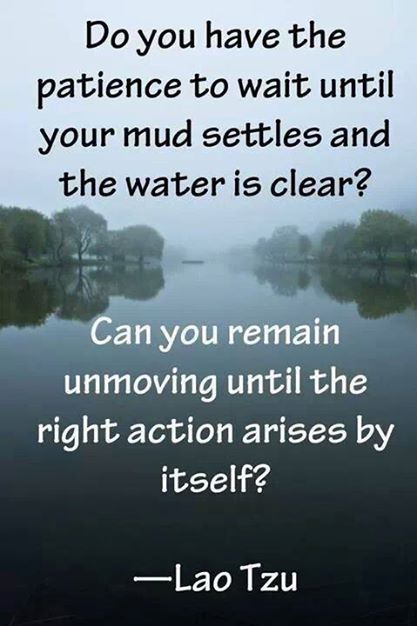
|
Can a plan of strategic inactivity prove efficacious? Why would doing nothing necessarily result in right action presenting itself, arising from the chaos of life circumstance? Does this make sense? Shouldn’t we get out there and proactively try things, and do something? Wouldn’t this be better than sitting around, pretending we’re some of kind of Yoda?
There is a time for action, and when it comes we can know the time. But, so often in life, the path forward is very muddy, no clear view, with too many possibilities, and none of them offering likelihood of success. In these cases, Lao-Tzu counsels waiting, and doing nothing. He also says that waiting and inactivity has won more battles than quixotically marching off into the unknown.
But why should nonaction work out well for us?
There is an underlying guiding hand, a universal intelligence. This force of reason superintends the cosmos toward destined outcome. Universal intelligence is beneficent by nature. Only good comes from it. Materialistic man cannot see and knows nothing of this architectonic and subsuming monitoring and shepherding. There is nothing bad in itself, but our self-interest and fear-based interpretations lead us to errant views. All things naturally flow and occur in accordance with this underlying universal wisdom.
When our vision is clouded, we do well to postpone action until we’re granted clear vision forward. Our part is to align our minds and spirits with a beneficent universal intelligence. The answer we seek will yet come, but will often shock us with an unexpected element. We would have done something else, and made everything worse.
Wait, wait for the answer to arise, and present itself, from the havoc and confusion of muddied waters.
|
more on the laissez-faire management style
reprinted from the "Summerland" page
‘you get what you deserve over here, and that peeves us’
The following is channeled information via the automatic-writing mediumship of Mary Blount White, reported in “Letters From Harry and Helen.”
Editor’s note: The speaker on the other side has a zany sense of humor as he explains his situation:
I have a hunch it is not so easy here [to be a success] as it looks at first. I cannot even get a look-in where your brother lives and enjoys working. He is so far above us I feel ashamed. What I mean, selfish cuss I must be, when a chap like him out-classes me so far I cannot even look at him… (Editor’s note: What he means by “can’t look at him” is that the brother is living in a neighborhood of higher vibrational essence. See discussion below on “why Summerland can’t be invaded.” The brother could “come down” (though there is no up and down) and visit the younger, but the other can’t “go higher” to visit the brother; not yet.)
On the whole, this is the place for a square deal. You get what is yours, and get nothing more nor less. Some of us are a bit peeved now and then, but one can't put up a kick, as ... you yourself are judge and jury. That’s the slick part of the arrangement. Self accused, you have no escape. You get a true line on your own past, your own true motives, and this innate force within does the rest. I can't but admire the simplicity and the lack of waste of the plan.
[There's truth in] "Thou, thyself, art heaven and hell." Think of the labor saving device it is. The system sets a soul free, leaves it alone, and the contained ingredients do the rest. Can you beat that, say?
Editor’s note: Yes, this “peeves” us no end. We don’t want to be held accountable for our actions. We want a 'get out of jail free' card. We want to hear about “mercy” and “grace.” We want a magic hand-sign from a Blackrobe to make the indictments all go away. This flippant fellow over there, a “selfish cuss” by his own estimation, in a few sentences, has given us a very good overview of the laissez-faire management style of God and the Guides. How does this “slick arrangement” work? Well, it starts here on the good ol’ Earth. It’s filled with evil, brutality, deception, greed. But does heaven send a squad of angelic policemen with flaming swords to clean it all up? No, things are allowed to unfold naturally. Civilizations fall under the weight of their own malfeasance and, by this natural consequence of living as a “selfish cuss,” we are all instructed concerning the right way to live. And when we move to the other side, it’s the same plan with no “waste,” no heavy-handed bureaucracy afoot to overtly steer people this way or that. If you want to live selfishly, see what it gets you – unpleasant natural consequences will be the response to one’s own actions. We judge ourselves, we ourselves are our own “heaven and hell.” There’s no outsider, no sky-god to blame. “The system sets us free and the contained ingredients do the rest.” Pretty “slick,” indeed. - For more discussion of this laissez-faire management style see "the 500 tape-recorded messages from the other side."
|
Is this world the best of all possible worlds?
There’s a cosmogonical view, one that I count as error, that the world was created by an imperfect being with limited abilities. Supporting this assessment is the pain and suffering we see everywhere on planet Earth. Surely, they say, we are looking at a flawed plan, one which could have been made much better if the supervising deity in charge of this universe had been more competent.
However, the question must be asked of these wiser ones, what would you have done differently? How would you make life in this world better? Would you stop crime as it’s happening? How could this be done without a ubiquitous thought-police invading the privacy of our minds at every moment? Would you stop crime before it’s happened? There are several movies which explore this preemptive strike, but, in each case, it called totalitarianism.
In fact, in Britain today, and beginning in Canada, as well, if you make some "offensive" comment -- "offensive" as defined by some holier-than-thou -- the police, the thought-police, will show up at your door. And how will you like that? - the police as local gods, nipping evil in the bud, before thought becomes action? Is this the kind of "Lord, stop all the evil" world we want? Would we want to live with this kind of totalitarianism? See the case of Adam Smith-Connor who was charged by police for praying for the wrong thing: inset box, bottom of page.
The larger question becomes, what is the best way of developing, bringing to maturity, creatures such as ourselves with godlike creative capacities? – all of which requires a freedom to choose; and this means, in the short term, a freedom to choose evil.
As I look at the evidence and weigh the possible ways of governing our world, I’m forced to conclude that our world is the best of all possible worlds, given the parameters which must address sentient beings endowed with a gift of volition. We could have a neat-and-tidy world, inhabited by pre-programmed automatons, every step of each day laid out for us - but who would want that kind of dystopia?
|
Editor’s note: Philosophers have long debated whether God created the Earth as “best of all possible worlds” or did God make a mistake? See the following, most remarkable, account of the Kogi people with super-advanced abilities of consciousness, rivaling what I once thought to be available only to those billions of years old! The Kogi shamans, well understanding the Western world’s insight concerning quantum fields of “all manner of possibility,” teach that, primordially, God did explore a near-infinite array of ways that the Earth could be set up, and what we have, all things considered, was deemed to be the best way. In the "Georgia Girl" writing Kairissi is adamant that she wants to be with someone who will look out for her best interests, and if his vision is very clear, she would want him to act unilaterally on her behalf, even, she says, if she disagrees, even if she fights him on this. I think the world was created for us with this sentiment in mind.
|
Consciousness, not matter, discovered to be elemental by the Kogi people of South America
In the “creativity” article, we spoke of the famous painting wherein Isaiah is listening.

Isaiah listening versus Isaiah questioning
We in the West are proud of the scientific method; and, rightly so, as it’s produced an awesome array of technological advancement.
However, there’s another, entirely different, but absolutely valid, approach to knowledge production of which we tend to be oblivious. It is the realm of intuition, of creativity’s “discontinuous” leaps forward, the quantum realm of the mind’s infinite possibilities, the child of Universal Consciousness.
In this latter world, Isaiah does best just to listen and will refrain from asking questions. Why this diminishment of questioning? Questioning does fine when allied with the scientific method but gets in the way when we enter the intuitive realm. The problem with questioning is that it presumes an intellectual framework into which we desire new information to fit. In a sense, we've already decided what the answer ought to be. But what if the answer is far above our present paradigms of knowledge with no correspondence to present understanding; in such case, it would be best to maintain silence and simply listen, as “The Wedding Song” uses the phrase, to “something never seen before.”
What I’m about to introduce must be presented in severe elliptical fashion. Brevity must rule as the subject is too large, but worthy of extensive study and consideration. I hope that you will learn more by searching the linked references.
the Kogi people have learned to listen
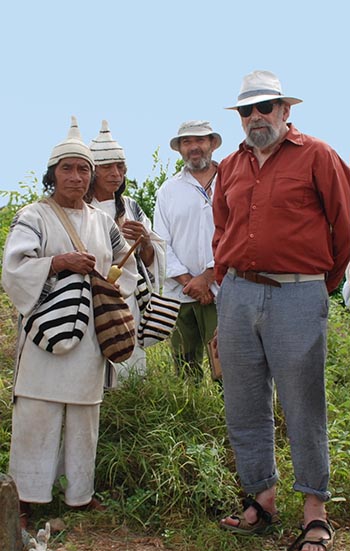
For some decades British journalist-anthropologist Alan Ereira has investigated the high-mountain tribal Kogi people who live in the Sierra Nevada de Santa Marta in the north of Colombia.
The Kogi have learned to listen to the whispering messages of Universal Consciousness, as expressed in Nature, to a degree that might be unrivaled in the world, save for the best medicine men of North American indigenous peoples.
We have discussed this form of "listening", this "going within" to access Universal Intelligence, on the "true self" page. But the Kogi are masters, far ahead in this, and take it to high art-form.
How can we confirm their expertise? The Kogi know things, and are able to do things, for example, in terms of environmental cleansing, reforesting, of healing the land, that we in the West are not able to do.
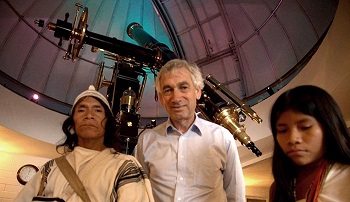
immediately picks out the one star in a blizzard of galaxies
During a trip to London, this Kogi master met with a leading astronomer. A photograph was brought out of the Hubbell “deep field,” a tiniest postage-stamp, and apparently empty, section of the inky blackness which, under intense magnification, revealed some few thousand galaxies. As confirmed by the astronomer in the video, the Kogi immediately pointed to the single star – not a galaxy – amidst the blizzard array and, in Kogi language, referred to it by name; as if it were a close friend! All this is sensational enough, but, let's keep in mind, this star resided in a section of the heavens totally hidden and unknown, totally inaccessible to human eyes, until just a few years ago.
Much of the Kogi wisdom remains cloaked to us. They refer to us in the West as their “younger brothers.” Prodigal brothers, we take it. They don’t fully trust us to do the right thing, as the memories still linger of the RCC-Conquistador brutalities and genocide.
But the Kogi understanding of Universal Consciousness (UC) is right in line with what physicists such as Prof. Amit Goswami tell us about the quantum realm: UC represents infinite possibility but has pared down the choices so as to direct reality toward prescribed goals and destinies. In this vein, Alan Ereira reports that Kogis have a view of “Mother [Consciousness] as memory and possibility.” This is Dr. Rupert Sheldrake’s “the mind is a quantum field of possibility.”
Out of this primordial essence of Mother Consciousness -- which is the ground of reality, not matter -- all things were created. However, before she created, she “explored, almost infinitely” the various possibilities to arrive at just the right mix for those of us who would inhabit Earth. This is the answer to Leibniz’s question of the “best of all possible worlds.”
See Beshara Magazine's article on the Kogi.
See Alan Ereira's report.
View Alan Ereira's video.
|

|
A long time ago, Art Mokarow instructed us ministerial students that it’s possible to change without suffering. It’s just that, for almost everyone, suffering is the only way people learn; we don’t change until the pain of remaining where you are exceeds that of altering a bad path in your life.
“There came a time when the risk to remain tight in the bud was
more painful than the risk it took to blossom.” ~ Anaïs Nin
When Superman said, “I’m sorry I left you, Lois,” his suffering was only beginning. He had no idea yet. He went away for a long time but then, when finally realizing, discovered that things had changed, and he couldn’t “get back to zero” anymore. He will suffer the absence of the one he "loved all along" for the rest of his life. And that protracted period of time-without-end will become his classroom and lesson-plan, ones of his own devising, a perfect fit for him, teaching him, too well, what is most important after all.
|
|
Mysterio fakes a crisis, employs the media and grand illusion, to grab worldwide power-and-control
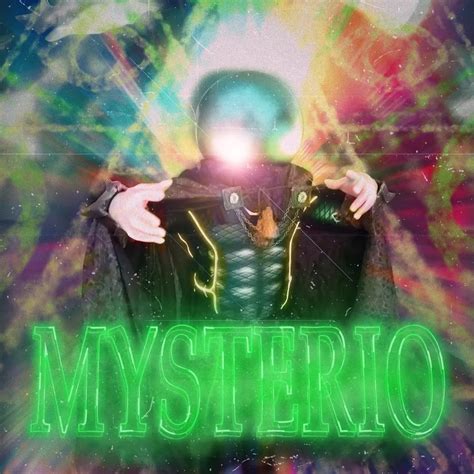
I’m probably one of the few who still remembers Mysterio as a comic-book baddie of the 1960s. But in a recent Spiderman movie, Far From Home, we find Mysterio concocting a grand charade of crisis, allowing him to burst on the scene as the caped invincible one and savior. But, it’s just a gimmick to justify his plans to be accepted as world potentate.
This is an old strategy by totalitarians, often in use in modern history, but going back anciently to the likes of Naram Sin and others of the BC world. Whenever there is a national calamity, such as a school shooting, the immediate response by totalitarians is "take away people's liberties." And they're not interested in other solutions.
The playbook reads thus, “Create a crisis, take advantage of a real one, or exacerbate some small issue, fake it if you have to, make much of it, beat the drums, do a rain-dance, say the sky is falling, then bite your lower lip with fake compassion, posture and position yourself as the glorious hero, the pious one, God’s agent of righteousness in the world.”
Marvel movies are stealth freedom-fighters. Read between the lines, see what’s happening. Virtually every plot has to do with some egomaniac trying to take over the world. Art mimics reality.
Some of the totalitarian-supporting media scoff with, “Today you can’t have a successful movie unless there’s a superhero in it”; meaning, the dull-witted masses require exciting fantasy.
But let me explain this: Marvel movies are popular not just because they feature heroes with exploits, but, primarily because, in each movie, totalitarian forces, deception and propaganda, high-handed rule-by-whim, are routed. And I guarantee you this, if the plots were to glorify a Dear-Leader socialism, a diminishing of personal freedoms, those movies with good-guys-in-capes would very quickly bleed red ink and suffer washout.

In this article, I include a short discussion on Mysterio because he symbolically represents the cause of much suffering in the world - whether on the macro stage of totalitarians attempting world-wide power-and-control, or on the individual level of people hurting each other to gain some perceived advantage, it's all the same spirit.
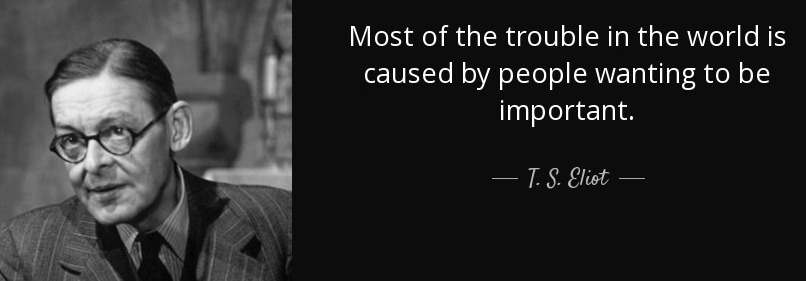
|
|
'out of the frying pan into the fire'
This is an old proverb from Roman writers 2000 years ago. It means “going from bad to worse.”
As we explore the topic of “why does God allow suffering,” this ancient saying reminds me of what I did to myself as a young person.
Elsewhere, I’ve recounted early experiences with the religion of parental family. Learning a few things about the dark history and legalistic ways of the church, at age 17 I decided that I was finished with it.
returning to the scene of the crime
However, in my leaping from “the frying pan into the fire,” as a freshman at university, I immediately allied myself with another church – which, as I would discover, was just as dictatorial, just as oppressive and draconian in its ways and view of God; and probably more so.
I would be caught in this religious totalitarianism for the next 25 years, all the way to age 44. Only then, finally, did I muster the intellectual savvy, the clearer frame of mind, indeed, the self-respect and maturity, to extricate myself from ecclesiastical dystopianism.
compelled to fail
And so I might ask myself: Why did I jump from the “frying pan into the fire,” why did I go from bad to maybe even worse? What was wrong with me to have allowed that?
Further, having confirmed and repeated my mistake, why did it take me so long to once again make the break? I well perceived the glaring dysfunction of the church: the money-raking, the sexual improprieties of the leadership, the high-handed pomposity, the self-serving interpretations of scripture, the fake altruism and compassion, the power-and-control mongering, the anti-humanistic embedded view. Even so, for a long time, I couldn’t bring myself to leave the cult; both cults.
obedient drones of the hive
In our discussion here of “why does God allow suffering?” the additional question might be asked, why didn’t God, like Superman, rescue me from all the empty god-talk lies and propaganda? Why did I have to waste 44 years of my life as a “true believer” in a religious collective? We might become angry, as did the cowboy in “Open Range,” railing against “the man upstairs” for having “done this,” for allowing this kind of travesty.
However, as we survey the mayhem of the world, we find all sorts of leaping “from the frying pan into the fire.” Here’s one that bothered me a lot.
In my “travels” through life over the years, I’ve met many women trapped in not just loveless but abusive relationships or marriages. At times, as appropriate, I might have offered a word of advice to some of these low-esteemed, with conversation to the effect:
“He’s abusing you, he’s taking advantage of you, you know this as well as I do, why don’t you leave, just start a new life, take charge of yourself, walk a new path.”
the prison door is open, but we won't walk through
The strange thing is, they pretty much always agreed, they knew what’s going on, they knew it’s all bad, they knew that if they stayed they’d never have a chance for real happiness and real love in this life – and yet – in most cases, they did nothing to help themselves. They remained.
driven: the zombie-like negotiation
But what’s even more strange is that many of these women had moved from relationship to relationship, from “frying pan to the fire,” a number of times. They had continued to choose abusive partners.
Why do they do this and why do they stay? – but then, why did I do the same and why did I stay for 44 years?
We could list many examples of those entrapped within various oppressive situations. In some or many cases they could leave if they chose to, but they do nothing.
All of these suffering ones might be included in our larger question, “Why does God allow this kind of suffering and oppression? God could stop it today, but he does not. Why does God allow evil in the world?”
Every situation is different, and yet, in essence, they are all the same. Here’s what I learned.
When I finally came to the point of understanding why I, myself, had entered, and remained, in dystopian arrangements, then, in general principle, it became clear concerning the malady afflicting others.
Why did I enter and remain? I couldn’t have answered this as a younger person. The answer – which, in general principle, is the answer for all of us – is discussed in ten thousand pages on Word Gems.
If the “false self” is running one’s life, then we look at the world through a filter of “I don’t have enough” because “I am not enough.” To remedy this, the false self seeks to align itself with a “strong father” figure, to live in a surrogate way, under the mantle of the protective power of some Dear Leader.
when the facts don't matter
This is the essence of cultism and speaks to the psychological profile of a little child, one who judges him- or herself unable to face the frightening aspects of a hostile and uncertain world. Burdened with this puerile frame of mind, a mind of fear and guilt, no logical argument will dissuade; because rationality cannot dislodge systemic fear.
Understanding all this, we can now begin to answer the question, “Why does God allow suffering?” - why does God not swoop in like Superman to save us from these structures of oppression in our world?
The answer is, it would do us no good – because we’d quickly find a new oppressive church to join, or a new dysfunctional relationship to enter, or whatever form of safety and security happens to be our perceived salvation at the moment.
rescue attempt cancelled due to lack of interest
There’s no point in rescuing a young man from one more dreary iteration of cult religion until he, himself, has found “the life within,” his inner link to God. When he does, he will never, ever again seek for external supports to fortify a sense of self. And now, for him, the world doesn’t need Superman.
a personal invitation, but heaven can wait
Editor’s final note: In my own case, age 44 was an important year. So, too, was age 45, a time of pivotal mystical revelation. Even so, despite this unscheduled “glimpse of higher reality,” I spent, to various degrees, the next 20 years, like Lana, trying to pretend it never happened. This reminds me of Jesus' parables of invitations to a wedding, but no one wanted to go. It can take a long time to grow up; at least, it did for me. I count age 65 as the beginning of a certain degree of steadfast maturity. No more running away after that. However, we might say, at 65 the game is pretty well over, and all that “might have been” in this life is now conceded as “never to happen” or decidedly lost. Or not. I no longer think in terms of “this life” and “next life” but, as it is in reality, one seamless life. The game is just starting, and hardly begun.
|
|
August Goforth addressed this issue of helping others. Those suffering in the Dark Realms are being helped by Spirit rescuers. However, there is no panicked effort to aid. From a higher viewpoint, all is well in hand and unfolding in a natural way, each is being personally instructed in a manner meaningful, and effective, to that individual.
Those who are of Higher Vibration can descend into the lower - as evidenced by those who work as "rescuers." So this is why the higher [disturbed spirits] can influence [even] lower earthly minds as well. But it must be understood that while one mind can influence another mind, it cannot control it -- ever.
The influence exerted may be strong and frequent enough to seem as if control is being achieved, but each individual mind always has the ability to listen, choose, and respond to and act upon these influences at any and all times. We cannot be slaves to others, although we may develop the thought-belief that this can happen - we can only enslave our self by our own thinking…
So while the Higher can descend to the lower, the lower cannot ascend to the Higher without assistance, and even then, for a very limited time and space. Because those inhabiting the planes lower than Earth cannot rise above their own plane, they cannot directly influence minds on the Earth plane.
But a mind on the Earth plane can descend into the lower planes - consciously or otherwise - by personal intent, or as influenced and led by another Earthly mind - and they can achieve this because their lower-vibrating thoughts and feelings are, by the Law of Attraction, gravitating them there. (A higher-vibrating person of Spirit would not lead us into a lower region.)
And once there, they are exposing their mind and spirit to the minds and spirits of the lower-vibrations, thus connecting with them, communicating and sharing information. A mind of an earthly inhabitant doing this would seem to be actually devolving rather than evolving, although "it all is unfolding perfectly, no matter what" as my Risen friends like to often remind me.
So while we could descend to allow or even seek lower influences, those lower influences cannot rise above to us to do the same - we must go to them in order to become exposed and contaminated. This often happens while the earthly person is sleeping and so able to travel to certain astral realms - lower or higher, depending on their own vibration, and also while under the toxic, life-dampening effects of such things as drugs and alcohol, as well as deeply negative states of mind.
In The Risen [book], we also caution against hypnosis and hypnotic energies, which also have the effect of allowing one mind to influence a weaker one and lead it to mental and emotional places that seek to divert the natural flow of the inherent wisdom of one's own individual spirituality. One's own truth resides within, nowhere else.
|
William Buhlman: "Imagine yourself in an ideal world where everyone is free to explore and develop their creative pursuits and experience their unlimited potential. Does this sound like heaven? Just think what an immature or undisciplined being could and would do in this ideal thought-responsive world. Picture the chaos and destruction that a single primitive mind could create ...Now for a moment imagine what kind of educational environment would be the perfect training ground for this undisciplined mind...Welcome to the dense training ground of matter, where focused thoughts are required in order to create and prosper. Welcome to the ideal environment where the young and undisciplined mind can learn by trial and error without contaminating the pure realm of spirit. Welcome to your life."
|
there can be no help received, nor help given, without the cooperation and desire of the student
A multi-faceted issue is that of charitable service – (1) what we can expect from God and the Guides, and (2) the skillfully crafted version of this offered to others.
As I survey the channeled afterlife literature, and also the opinions concerning such from this world, one finds a vast confusion of conflicting ways and means.
In the “500 tape-recorded messages from the other side” writing, I spent much time discussing the errant philosophies of those I call “the insane 500”. But it’s not just me, there is much debate on that side, and wiser heads strongly disagree.
One of the articles on the “Satan” page presents the question, “Is there such a thing as highly advanced, super-powered evil in the universe, such that it could muster strength to invade Summerland?” You’ll want to study this important concept, however, the short answer is, no, there is no such thing as personified greatly competent evil in the universe. In that article, I offered transcription of tape-recorded discourse from Spirit-Guide Abu, 3500 years on the other side. He says many things in the course of his talk, but one thing stands out: he said that the Spirit Guides are “powerless” when it comes to directly influencing or requiring an immature person to grow or to change spiritually.
“Powerless" tells us much about how the Guides operate. And it’s coming from one of the ruling class of the universe, those wielding unimaginable super-powers, if they chose to unleash it.
So, what does this mean? It means that no one is forced to do the right thing. It has to come from within. It’s the “prime directive” over there. And if one chooses to be wayward, then one has the right to suffer, even for thousands of years, if that’s what one prefers.
Over many years, I have addressed this entire question in many WG writings. But as I reviewed the Abu transcription one more time, a new question came to me: Are there different degrees of help that one might receive, depending on where one is in the universe; for example, here on Earth, or in the Dark Realms, or among the “insane 500” in Summerland? All of these denizens might be immature and disadvantaged, but – is there one standard to determine a receiving of help if one resides in a dark place, but another standard if one is in our world or in Summerland?
For a long time, at least subliminally, I judged the inhabitants of dark detention as “more needy,” in a state of such destitution that more should be done for them. But I came to see something inelegant and unbalanced about this view. Does God have different ways of teaching depending on how much one has messed oneself up? And should there be a “more lenient” method employed for the Summerland immature ones? for, after all, they’re already, seemingly, in a good place, and so, maybe their need is not so great?
But this began to make no sense to me. I think there’s only one program of mind development, and it doesn’t vary depending on one’s zip code. The great confusion here stems from misguided, but popular, views on how to help, to change, another human being. The “insane 500”, along with many teachers in this world, have much confidence in their ability to directly serve as catalyst for change concerning another human being.
But, this confidence is illusionary. And this is why Spirit-Guide Abu will have none of it with his profession of “powerlessness” regarding producing, as primary causal efficacy, real spiritual change for an immature one.
I think we need to know about this because, when we get to Summerland, the “insane 500” will try to recruit us for their purported service projects. Are these good works skillfully crafted to actually do some good, or is it merely meddling? worse, a kind of “photo opp” for dysfunctional service coordinators who want to proclaim, “see all the good works I’m doing, this means I’m really advancing fast.”
There are all kinds of jobs in Summerland: tending gardens, caring for animals, teaching in grade schools, working at a university library; thousands of different jobs. But when it comes to work touching upon the maturation of the human mind, we need to tread carefully; although, many do not.
In broad principle, there is only one method by which God brings us to greater sentience.
Allow me to quote from another Abu discourse, the story of Alfred, fallen WWI soldier, who woke up in a “half-way”-house world wherein he did nothing, just resting, under a tree, for a very long time:
A time came when Alf began to feel very fed-up with doing nothing. Even so, he didn't know what to do about it, but, he knew, if he were given opportunity, he would change his life.
When he made that decision in the silence of his mind, he discovered that he had a visitor, a very nice lady came to him under his tree. And she asked him if he'd like to leave this world of inactivity. He immediately agreed and set himself on a path of spiritual improvement.
The focus of one’s ability to change, no matter the world one occupies, will be a decision.
No one can light the inner fire for us. We alone can and must do this. And all programs of charitable service, which impinge upon helping someone toward greater maturity, must honor the principle of self-direction. If the advancement is not the desire of the student, there will be no advancement.
In the Dark Realms, the Guides can do nothing, are "powerless", until the suffering one is ready to choose a better way. Until that decision is made, the Guides merely “hover”, we might say, waiting for the right frame of mind. And this principle holds true for the Earth and for Summerland – or anywhere.
final thought
It's not just a decision to be helped, but it has to be for something that we can't do for ourselves - there is no spiritual nanny service in the universe; and even if we can't do it ourselves, the answer to a request might be, wait, no, or it's for later.
But if the object of our request is spiritual maturity, not just for things, then this kind of prayer is answered immediately, but only in tiniest increments, "flashes" or "sparks" of insight, baby steps. Why such small amounts? - we couldn't take more than that.
|
postscript:
why we remain: going deeper
There are many reasons why people stay in the cults; however, there’s only one core reason: fear.
Some of this fear might express itself as low self-esteem, a diminished self-respect, a feeling of unworthiness, a floating sense of existential guilt, issuing as a perception of deserving to be abused or punished. This low opinion of self enslaves many.
And there’s a second category of reason why people stay. It’s also a form of fear, but it doesn’t seem like it at the time. This fear is often cloaked in some form of apparent high-minded idealism, of “this is what I’m required to do though it cost me much suffering.”
As I look at my own case more closely, as I perform the autopsy, I know very well why I didn’t leave. It was a version of the second reason. I knew about the improprieties of the church, but, for a long time, I felt that it was God’s will that I remain where I was; meaning, I felt I had no right to leave.
obey, pray, pay - and stay
Cultish religious organizations preach a lot about “top down” authority; that, God works through the chosen and sanctified hierarchy, even if it is reprehensible and boorish. “God will deal with us if we sin,” goes the logic from the pulpit, “but your job is to obey, pray, and pay.” We should also include, “stay” – you’re not allowed to leave, without calling down the displeasure of God. Cults have you lassoed and hog-tied with that kind of dark teaching. It gives the hierarchy a blank check to do whatever they like, treat you however they like, and you just have to take it, because it’s God’s will, you see.
This is one way they keep you on the plantation. However, another way is through their “infallible holy” doctrines. You’re obliged, under pain of being eternally cut off, a one way ticket to the Lake of Fire, if you step outside the regimen of the annual holy days, weekly gatherings, rituals, etc., etc. In my particular case, the hallowed day of the week set apart for worship, deemed to be ultra “holy”, was a major sticking point for me. I could see strong Old Testament support for the rubric, and no way around it. This held me, bound and tethered, for many years.
not to study that hard
Now, I might ask myself, with all of the study of scripture I did for decades, why didn’t I see things more clearly earlier on? Bible study, along with prayer (and occasional fasting), was mandated by the church, something we were supposed to do every day. However, they didn’t want you to study that hard, to the point of undermining church policies. Nevertheless, over time, as I learned more and more, not just from personal study of scripture but from the scholarship of many others, I finally understood that God, if fact, did not support the church’s narrow view of how things work.
In receipt of this liberating knowledge, having finally answered questions that had kept me intellectually chained for many years, I immediately, not waiting even a day, left the church, zooming like the proverial "bat out of hell," and have never regretted the decision for a moment. See my Galatians commentary as a path to a better view.
However, in this postscript, I would like to address the justifying reasons of “why people stay” in a more general way. The experience of each particular person suffering in the cults will be different, and yet, for many of them, if falling under the heading of my “second reason,” people often remain due to some sense of responsibility to “do the right thing” before God. This is a noble mindset and not to be minimized; yet, this impulse must be built upon a sure foundation of Truth, else we shall trouble ourselves greatly.
|
more than drinking the koolaid
The long reach of cultism encompasses much more than crackpot churches. The root idea of cult offers the sense of "cut." This core concept of "cut" leads us to images of refinement and refashioning and, by extension, development, control, pattern, order, and system.
Cultism as systemization finds a ready home in religion and philosophy which seek to regulate and redistill the patterning and ordering of ideas. However, in a larger sense, the spirit of cultism extends to every facet of society. We find it scheming and sedulously at work in politics, academia, family, corporations, entertainment, science, artistry – anywhere power might be gained by capturing credulous and fear-based minds.
See the “cultism” page for a full discussion.

|
What I would like to share, however, is a line of reasoning that never occurred to me during those “44 years”, except at the very end. If I had entertained certain viewpoints earlier on, I might not have needed to wait for the scriptural justification (which, later, I perceived was never necessary at all).
What I missed was this: What are the implications of a church doctrine in terms of defining the nature or character of God?
what does this say about God
Think about this with me. On the “Jesus” homepage, I offer a long self-discussion concerning what kind of person God would have to be for the salvation doctrine via Jesus to be correct and true. I will suggest that you read that discourse there as it’s too lengthy to reproduce here. However, essentially, as is the case with many of the well known doctrines of Christianity, God is implicitly made out to be some kind of maniac, perverted person, or sociopath if he, in truth, thought and acted as per the doctrines of the church.
You must do your own meditation on this. But, if you begin to see what I’m talking about, it will become clear that a God of love, rationality, justice, fair-mindedness and natural law – we could add many other traits – would never, ever subscribe to the so-called “holy infallible doctrines.”
The line of reasoning I’m suggesting here would also apply to many women trapped in loveless and/or abusive marriages. I say this because so many of these women are very good women and they want to do the right thing, they want to honor God in their lives – and so, believing that “God hates divorce” and that “the husband has the final rule” over her, she stays. But none of this reasoning holds any water upon closer scrutiny - not in a biblical sense, and especially not in a “divinely humanistic” sense, in terms of the kind of person God would have to be to keep suffering women in a mismatched dysfunctional relationship, just "running the clock out" as the main goal of their lives. This subject will require your own meditation to see clearly the truth of this common problem.
jail break: we're bustin' outta here tonight
I began this postscript by speaking of a lack of self-respect. Self-love is needed, for many reasons but, it’s required here in order to give yourself permission to follow the dictates of your own sanctified mind -- once you begin to see that you have a right “leave the plantation” and that God won’t be mad at you.
it seems to take a long time to accept that God is not the problem in any of this and would never be mad at us
See Father Benson's comments on this from the afterlife.
Your own soul will lead you to the revelation that God would never be mad at you even if you did something really wrong. But, certainly not to help yourself escape mind-numbing suffering. However, as stated, even if you begin to see and understand this ticket to liberty, you have to trust yourself, love and respect yourself, enough to make it happen, to follow the inner whispering-guidance of your own person.
That’s probably the hardest part of the prison break.
By the way, in Galatians Paul uses three analogies to describe all religions (as opposed to "life in the spirit"), and one of the comparisons is a prison.
|
you are as little children, and your instructors are preparing you for what is to come
An afterlife spirit-person teacher offered commentary on the issues discussed above. He said that the task before us, that of preparing our hearts and minds to live in eternity, is no small venture and requires a great deal of guidance and education. But, see this in his own words:
Channeled information via medium Mrs. Elizabeth Sweet, The Future Life: an address to the Circle of Hope, by Apollos Munn, who had lately passed to the other life - October, 1852.
I perceive that I am at this time an unexpected visitor to you, and to the medium also. But for some time past I have been waiting for an opportunity to make myself known, that I might be enabled at times to converse with my friends on earth in whom I am so much interested. My feelings have lately been attracted toward the happy little circle in which you weekly assemble, and where you attract around you a class of spirits whose influences encircle you as with a wall of fire, the light of which shall repel all inharmonious spirits that do not love the light, because of their affinity for darkness.
I see that this fire, kindled by love and harmony, which constitutes brotherly love, will closely bind you as with a chain whose links shall become more immovable, as the desires of each shall fervently ascend to Heaven for strength to progress into the heaven on earth which you are all expecting to realize. And to attain this end, let each and all of you measure your own heaven by your own experience, extending your mind to no greater than that which you are able to grasp.
Be content with the unfolding of the germ [of mind and soul] which in due time will become a bud, and which, when the bud is sufficiently matured, will burst into a flower. But were the flower to unfold before it was sufficiently strengthened to receive the rays of light, it would shrink back within itself, and be withered by the effulgence which it could not bear.
My wish is, that every soul may see its own heaven. Oh, do not measure your own experience by one another's, but look within your own hearts, and receive the draught of happiness in whatever measure it may be meted out to you, and be assured that you receive as much as you are able to bear, though it may seem to come slowly.
The spirits, whose loving forms surround your dear circle, would fain [be obliged or gladly] fill you with their own gladness to a greater extent than they have been able to do; but the power, the will, and the wisdom that direct for your ultimate good, will it to be as it is.
My dear friends, none should have any cause for complaint while enjoying the privileges of spiritual intercourse; but you should receive all messages from the spirits gladly, and with a pure desire for knowledge and wisdom and truth.
little children do not ask the propriety of lessons required of them, even if seemingly unpleasant
And if you cannot behold the fruits of your labors now, you should remember that you have been advised to be as little children, and being as little children, you will not ask the propriety of the lessons which you receive, when you feel that your instructors are doing all in their power to prepare you for the state in which to perform your works of duty, in the several paths in which you will be called upon to tread.
A great work, to be greatly advanced, must be carried along slowly, continually, and steadily, yet with an unwavering faith.
The workmen must first lay a sure foundation, which must first commence in their own minds; and when the foundation is sure, solid, and unshrinking, then it is time to proceed swiftly with the rearing of the structure, the greatness of which will require many and all manner of laborers before it shall attain its perfection. And patience, hope, trusting, and long-suffering, will be requisite for each and all, while this mighty work proceeds.
Will any murmur, if even a lifetime should be spent in endeavoring to cast a ray of light on the path of their fellow-travelers, that they may also know and experience the beauties of the light which has been shed upon your way? And is not the enjoyment of this light richly worth seeking for? Does it not cast a gleam of joy upon your souls when they are heavy-laden? and does it not come to you as a ray of sunshine when all looks dark in your material state?
As ye seek so shall ye also find, and when the desires of your heart shall knock at the door of the inner world, it shall be opened to fill you with the joy for which you are seeking … And they tell me that I am yet a very child in the enjoyment of the rest which is prepared for those who love truth…
Be ye dwellers in the green and shady valley, and listen to the quiet murmur of the stream whose waters are as a deep flow of joy. Seek not to climb the mountain while you are yet feeble, but enjoy the beauties within your reach, and let the mountain come to you. When you have become sufficiently strong, you will not be overcome by the brightness of the light.
My desire is, that your circle may be one of love, harmony, and usefulness.
|
|

how can he blame you for being human when he made you human
|
episode 4, season 2, “The Driver” (1995)
Debra (weeping): I can't do it right all the time.
Monica: I know that. God knows that. How can he blame you for being human when he made you human?
|
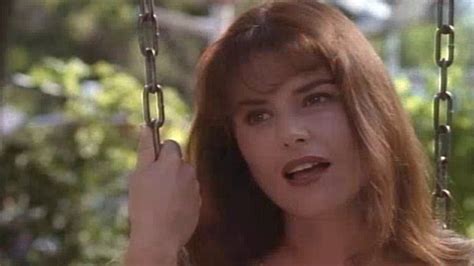 |
Editor’s note: Absolutely. Monica nails the central issue. The vaunted “church fathers” would have done better asking themselves the simple question, How can God blame you for being human when he made you human? Our task today is to separate ourselves from the ancient “holy doctrines,” the respected lies about God, which purport otherwise.
READ MORE
|
a clear and simple example of why suffering can be an effective teacher
There are many examples, but I’ll speak of one, and then your meditations will offer many more.
In the US, we celebrate the Fourth of July -- Independence Day, we call it. What does this day mean to many? The truth is, not much. It’s a day off work, of cook-outs, of colorful light shows.
only former prisoners know the meaning of the word 'freedom'
But, “Independence Day”? – what would this even mean? Only those who’ve lived as prisoners, been persecuted by totalitarian regimes, labored under despotic rule without civil liberties.
Some immigrants to America do know what it means; some have lived under Communist rule, or even have escaped the mind-controls of various cults of the world. Note: this "cult" may be as close as your friendly neighborhood autocratic church.
But, most of us, are rather bovine-like at the mention of words such as “freedom” or “liberty.” Many millions today in America are enamored by socialism, think it’s wonderful. And many also think that Hitler wasn’t such a bad guy, just misunderstood.
The ancient Spirit Guides working as missionaries in the Dark Realms speak of the need to have “the lust for evil ground out of the soul.” This ought to give us pause. An efficacious “grinding” often comes by way of suffering. It’s a stern classroom.
We are headed for Summerland. But there is reason why most will need to take a temporary unpleasant detour before we allow ourselves into the better neighborhoods over there. Most of us will not be ready, no sensibilities or capacities, to appreciate a world designed for maximum enjoyment. Summerland would utterly ruin the bovine-like.
The truth is, we don’t really need to suffer in order to learn. It’s just that, for so many, they won’t have it any other way. We are required to learn by suffering only until we’re able to learn by joy, which transcendental experience is by-product to “going within.”
Editor’s note: We’re informed by ancient Spirit Guides that Twin Souls are prepared for the eternal marriage by what’s called “the law of repulsion” and “the law of attraction.” It seems that certain unpleasant encounters are arranged for them early on so as to keep them apart, which separation, eventually, leads them to fervent desire to be together. Read about this here.
But it occurred to me that this lesson plan for the development of Twin marital love is but mere subset to a much larger process in play which teaches most everyone. When we enter suffering, it’s our “law of repulsion,” an aversion therapy, later sending us, as escaped prisoners, like the boy named Sue, to a better point of view.
|
What is the point of this world, filled with war and violence? When we gain self-knowledge, the purpose of the world becomes clear without our asking.
16.April.1952. Question: I have lived through two catastrophic world wars. What is the point of this existence? Krishnamurti: Can you, as an individual, eradicate from your own mind those qualities that create antagonism, hatred, enmity? When we know for ourselves that we are free, then the purpose of existence comes into being without our asking.
|
|























